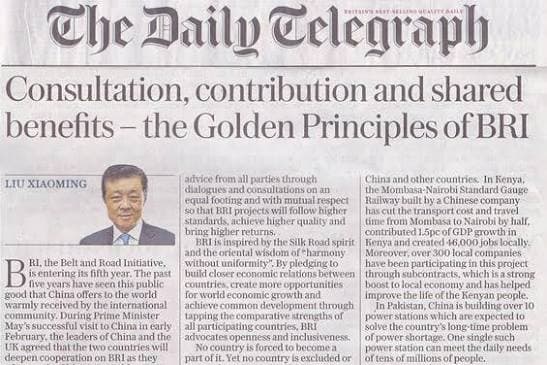We're loading the full news article for you. This includes the article content, images, author information, and related articles.
The withdrawal of a £500 million bid for the UK’s Daily Telegraph, prompted by new foreign ownership laws and newsroom revolt, raises critical questions for Kenya's own media landscape, where regulations on foreign investment remain notably less stringent.

LONDON – American investment firm RedBird Capital officially withdrew its £500 million (approximately KSh 85 billion) offer to acquire the Telegraph Media Group on Friday, 14 November 2025, EAT. The collapse of the high-profile deal, which has left the 170-year-old British newspaper in ownership limbo, was driven by a combination of intense regulatory scrutiny, unprecedented opposition from within the Telegraph's own newsroom, and concerns over the bid's financial backing. A spokesperson for RedBird confirmed the withdrawal, stating the firm would "work hard to help secure a solution which is in the best interests of employees and readers."
The saga highlights a significant policy shift in the United Kingdom regarding media ownership. The deal's failure is intrinsically linked to the UK's Digital Markets, Competition and Consumers Act of 2024. Enacted in May 2024, the law explicitly prevents foreign states from gaining control or significant influence over UK newspaper enterprises. This legislation was a direct response to an earlier 2023 takeover attempt by a consortium of RedBird and the Abu Dhabi-backed International Media Investments (IMI). IMI is controlled by Sheikh Mansour bin Zayed al-Nahyan, the vice-president of the United Arab Emirates.
While RedBird's revised 2025 bid was structured to comply with the new rules—which, following a recent amendment, cap foreign state-owned entities' stakes at 15%—the UK government still intended to subject the deal to a full regulatory review. This protectionist stance contrasts sharply with the investment landscape in East Africa and raises important questions about the balance between attracting foreign capital and protecting national media interests.
A remarkable factor in the deal's demise was the sustained internal opposition from senior journalists and editors at The Telegraph. The newsroom published a series of articles investigating RedBird Capital's alleged financial links to China, prompting calls from British parliamentarians for a formal inquiry. In a note to staff, Telegraph editor Chris Evans acknowledged the widespread concerns, stating, "it's no secret that I, all the senior editors and many of our writers had concerns about this bid." Sources close to RedBird cited this negative internal coverage as a key reason for withdrawing, expressing disappointment at the opposition to a deal they argued would have helped British media.
The UK's move to legally shield its press from foreign state influence offers a powerful case study for Kenya. According to a 2022 report by Freedom House, Kenya has limited laws and regulations governing foreign and cross-media ownership, creating a potential vulnerability to external influence. While the address and nationality of media owners must be reported, there are no definitive caps on the proportion of foreign ownership for radio and television outlets. This stands in stark contrast to the UK's newly enforced 15% limit for foreign state investment in newspapers.
The debate is particularly relevant as China and Gulf states, the very sources of investment that sparked concern in the UK, are major sources of Foreign Direct Investment (FDI) in the East African region, according to the East African Community. The conversation around media ownership in Kenya is active, with a Thomson Reuters TrustLaw report noting that the government has considered reviewing foreign ownership policies to attract more investment. This approach prioritizes economic growth and investment, but the Telegraph case demonstrates the potential risks to editorial independence and national interest that can arise.
As Kenya continues to position itself as a hub for international business, the collapse of the RedBird deal serves as a critical reminder of the global debate surrounding media sovereignty. The UK's decision to prioritize press independence over a major foreign investment provides a clear, albeit contentious, precedent. For Kenya and its East African neighbours, it underscores the urgent need for a robust public and policy dialogue on how to structure media ownership laws to both encourage investment and safeguard the integrity and freedom of the press, a cornerstone of democracy. Further investigation into Kenya's current legislative review process is required to determine the future direction of its media landscape.
Keep the conversation in one place—threads here stay linked to the story and in the forums.
Sign in to start a discussion
Start a conversation about this story and keep it linked here.
Other hot threads
E-sports and Gaming Community in Kenya
Active 9 months ago
The Role of Technology in Modern Agriculture (AgriTech)
Active 9 months ago
Popular Recreational Activities Across Counties
Active 9 months ago
Investing in Youth Sports Development Programs
Active 9 months ago